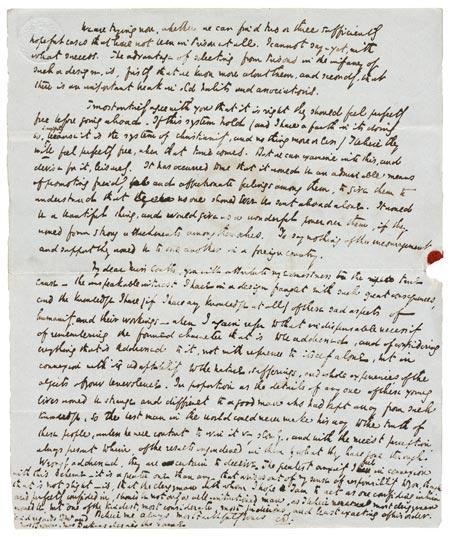
Autograph letter signed, London, 3 November 1847, to Angela Burdett-Coutts
Purchased with the assistance of the Fellows, 1951
Dickens's letters to Burdett-Coutts are, by any standard, extremely long and detailed and reveal his extraordinarily competent administrative abilities as well as shrewd insight into the minds and motivations of the women who would enter Urania Cottage. He insisted "that their past lives should never be referred to." He also recognized "that these unfortunate creatures are to be tempted to virtue. They cannot be dragged, driven, or frightened." Dickens's meticulous attention to detail is apparent in this letter, in which he informs Burdett-Coutts that "I have laid in all the dresses and linen of every sort for the whole house... I have made them as cheerful in appearance as they reasonably could be—at the same time very neat and modest."
Philanthropy
From 1840 Dickens guided the charitable work of philanthropist Angela Burdett-Coutts (1814–1906), the wealthiest heiress in Victorian Britain. Dickens served as her official almoner and helped to assess the merits of the thousands of letters she received from those seeking financial assistance. He also advised on her plan for improved sanitation in the slums of Westminster and drew her attention and support to the Ragged School Union, which provided education to London's poorest children. A pragmatist, Dickens encouraged Burdett-Coutts to direct her philanthropy toward the causes of distress. In 1847 they founded a home, Urania Cottage, in Shepherd's Bush, as a shelter for homeless women—prostitutes or petty criminals who sought to rehabilitate themselves by learning practical skills and developing self-discipline. Many of the women were assisted to eventually emigrate to one of Britain's colonies to begin a new life. For more than ten years, Dickens administered Urania Cottage on behalf of Burdett-Coutts and played an extremely active role in its day-to-day management.
e are trying now, whether we can find two or three sufficiently hopeful cases that have not been in Prison at all. I cannot say—yet, with what success. The advantage of selecting from Prisons in the infancy of such a design, is, firstly that we know more about them, and secondly, that there is an important break in old habits and associations.
I most entirely agree with you that it is right they should feel perfectly free before going abroad. If this system hold (and I have a faith in its doing so, simply because it is the system of Christianity, and nothing more or less) I believe they will feel perfectly free, when that time comes. But we can examine into this, and devise for it, leisurely. It has occurred to me that it would be an admirable means of promoting friendly and affectionate feelings among them, to give them to understand that no one should Ever be sent abroad alone. It would be a beautiful thing, and would give us a wonderful power over them, if they would form strong attachments among themselves. To say nothing of the encouragement and support they would be to one another in a foreign country.
My Dear Miss Coutts, you will attribute my earnestness to the true cause—the unspeakable interest I have in a design fraught with such great consequences, and the knowledge I have (if I have any knowledge at all) of these sad aspects of humanity, and their workings—when I again refer to that indispensable necessity of remembering the formed character that is to be addressed, and of considering everything that is addressed to it, not with reference to itself alone, but in connexion with its adaptability to the nature, sufferings, and whole experiences of the objects of your benevolence. In proportion as the details of any one of these young lives would be strange and difficult to a good man who had kept away from such knowledge, so the best man in the world could never make his way to the truth of these people, unless he were content to win it very slowly, and with the nicest perception, always present to him, of the results engendered in them by what they have gone through. Wrongly addressed, they are certain to deceive. The greatest anxiety I feel, in connexion with this scheme—it is a greater one than any that arises out of my sense of responsibility to you, though that is not slight—is, that the clergyman with whom I hope I am to act as one confiding in him and perfectly confided in, should be not only a well-intentioned man, as I believe most clergymen would be, but one of the kindest, most considerate, most judicious, and least exacting of his order.
Believe me Always Most Faithfully Yours
CD.
